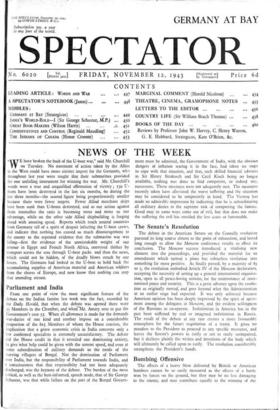The Senate's Resolution
The debate in the American Senate on the Connally resolution pursued its long -course almost to the point of exhaustion, and lasted long enough to allow the Moscow conference results to affect its conclusion. The Moscow success introduced a vitalising new element into the proceedings, and provided the material for an amendment which turned a pious but colourless resolution into something far more positive. As finally passed, by a majority of 85 to 5, the resolution embodied Article IV of the Moscow declaration, accepting the necessity of setting up a general international organisa- tion, open to all peace-loving nations, for the maintenance of inter- national peace and security. This is a great advance upon the resolu- tion as originally moved, and goes beyond what the Administration at an earlier stage had expected. It was only achieved because American opinion has been deeply impressed by the spirit of agree- ment among the delegates at Moscow, and the evident willingness of the Russians to co-operate. Isolationism in America has in the past been stiffened by real or imagined isolationism in Russia. The result of the debate at any rate creates a more favourable atmosphere for the future negotiation of a treaty. It gives no mandate to the President to proceed to any specific measures, and leaves the Senate's powers to ratify or not to ratify unimpaired, but it declares plainly the wishes and intentions of the body whiCh will ultimately be called upon to ratify. The resolution considerably strengthens the President's hands.


























